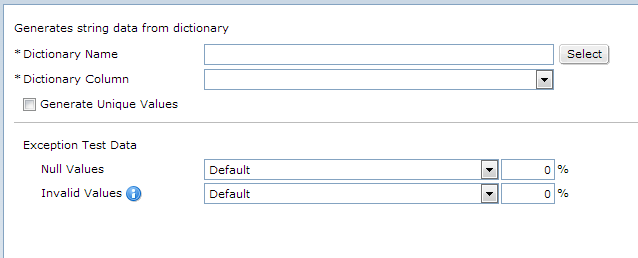

Parameter | Description |
|---|---|
Dictionary Name | The name of the dictionary. You need to import a dictionary in TDM. |
Dictionary Column | The column that you want to get the data from. If the values in the dictionary are larger than the size of the column then it truncates the values. |
Dictionary Lookup Column | The lookup column in the dictionary that you can match with the table column to generate data. When you assign a standard generation rule to a column or create an ad hoc generation rule, you can specify the lookup column. This field is optional. If you enter double data type value in the lookup column and table column, the process generates null values in the target table. |
Table Column | The column in the target table based on which you can match the lookup column in the dictionary. When you assign a standard generation rule to a column or create an ad hoc generation rule, you can specify the table column. This field is optional. If you enter double data type value in the lookup column and table column, the process generates null values in the target table. |
Serial Number Columns | A serial number to find the location of the data. You can configure serial number for relational databases and not for flat files. You enter the serial number column for binary data types. |
Generate Unique Values | Generates unique data values. You cannot generate unique values for flat file dictionaries and binary data types. |
Null Values | A list of global rules or a default rule that is available for the data type you select. A null value is a value that a default rule or a global rule generates in the target for the columns based on the data type you select. |
Invalid Values | A list of global rules or a default rule that is available for the data type you select. Any value that does not exist in the dictionary is not valid. You cannot generate values that are not valid for binary data types. |